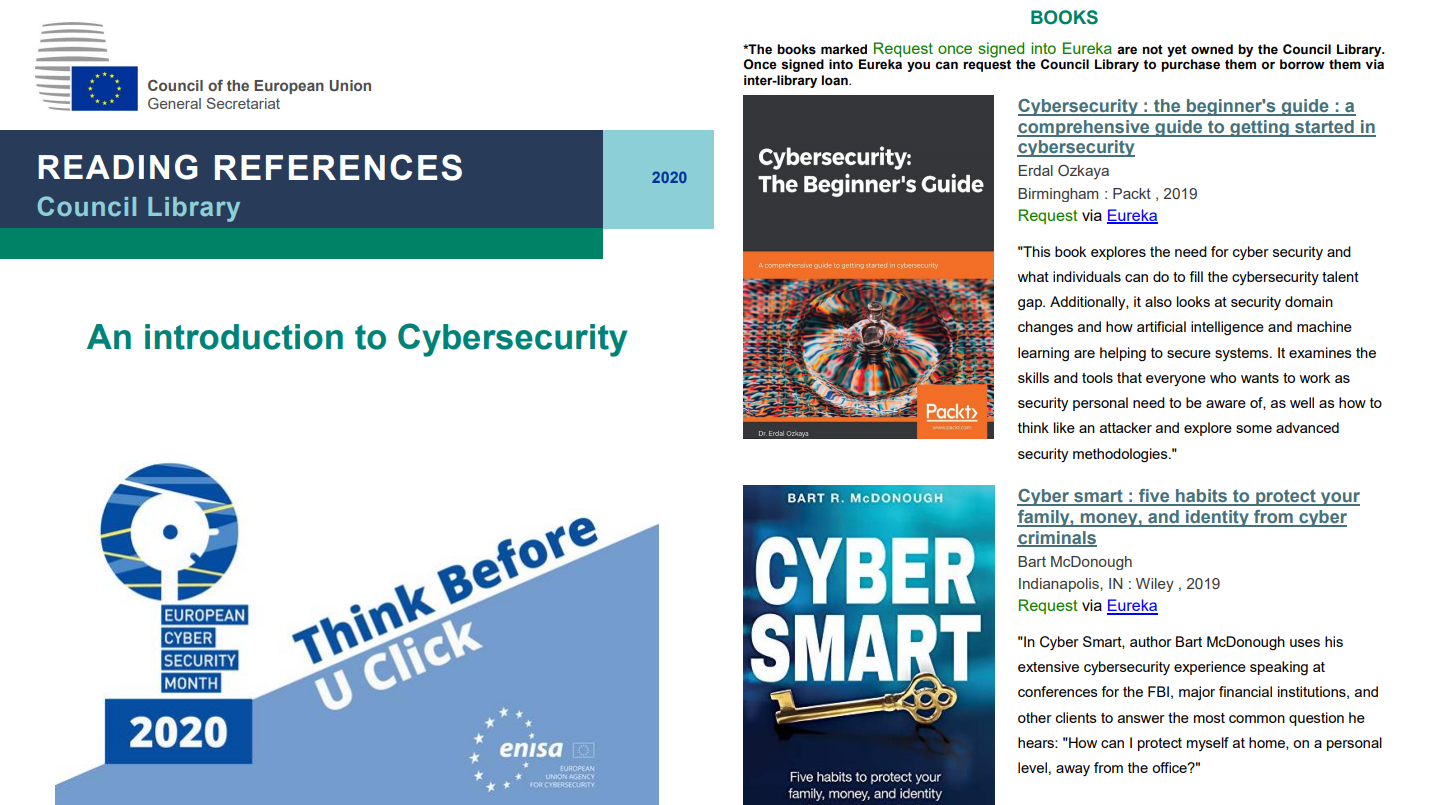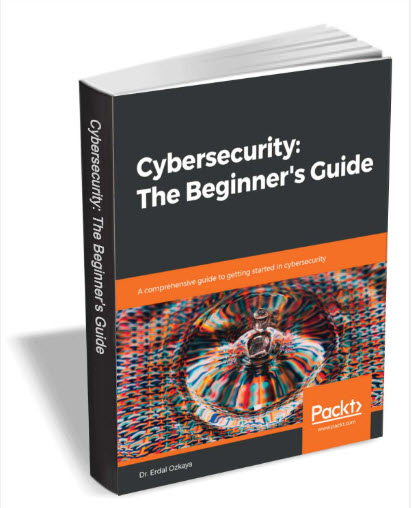
Council of the European Union ” 12 new Reading Refences “
Cybersecurity is becoming a more crucial topic in both policy making and the every-day life of European Union citizens. With October being the European Cyber Security Month the Council Library has compiled a reading list relating to personal cybersecurity as well as the importance of a strong national and international cybersecurity infrastructure. And I am proud to see my book ” Cybersecurity : The Beginners Guide ” in the top of list. As a European born ( Germany) Australian , this makes me even prouder.
Council of the European Cybersecurity Books recommendation full document
https://www.consilium.europa.eu/media/46382/introduction-to-cybersecurity-2020.pdf
An introduction to Cybersecurity
Cybersecurity is becoming a more crucial topic in both policy making and the every-day life of EU citizens. With October being the European Cyber Security Month the Council Library has compiled a reading list relating to personal cybersecurity as well as the importance of a strong national and international cybersecurity infrastructure. It contains numerous books and articles that you can access via Eureka.
European Cybersecurity Month (ECSM) is the European Union’s annual campaign dedicated to promoting cybersecurity among EU citizens and organizations, and to providing up-to-date online security information through awareness raising and sharing of good practices. The Cyber Security policy page on the European Commission’s website also contains many useful resources. Reading list compiled by the Council Libraries
Please note:
This bibliography is not exhaustive; it provides a selection of resources made by the Council Library. Most of the titles are hyperlinked to Eureka, the resource discovery service of the Council Library, where you can find additional materials on the subject. Access to some resources might be limited to registered Council Library users or to users in subscribing institutions.
The contents are the sole responsibility of their authors. Resources linked from this bibliography do not necessarily represent the positions, policies, or opinions of the Council of the European Union or the European Council. Reuse of the covers is prohibited, they belong to the respective copyright holders.
The Council Libraries cooperate with the Learning Centres of the European Commission, along with other Belgian and international libraries, and can borrow material from them. If you are interested in any of these references, please submit your request to the Council Library. The books can be delivered to your office. Click on Request interlibrary loan via Eureka hyperlink and fill in the form, or contact [email protected]
Cybersecurity Reading Refences
BOOKS
Council of the European Union ” Reading Refences ”
Cybersecurity : The beginner’s Guide : A comprehensive guide to getting started in cybersecurity
Erdal Ozkaya
Birmingham : Packt , 2019
Request via Eureka
“This book explores the need for cyber security and what individuals can do to fill the cybersecurity talent gap. Additionally, it also looks at security domain
changes and how artificial intelligence and machine learning are helping to secure systems. It examines the skills and tools that everyone who wants to work as
security personal need to be aware of, as well as how to think like an attacker and explore some advanced security methodologies.”

Cyber smart : Five Habits to protect your family, money, and identity from cyber criminals
Bart McDonough
Indianapolis, IN : Wiley , 2019
Request via Eureka
“In Cyber Smart, author Bart McDonough uses his extensive cybersecurity experience speaking at conferences for the FBI, major financial institutions, and other clients to answer the most common question he hears: “How can I protect myself at home, on a personal level, away from the office?”
The Ethics of Cybersecurity
Markus Christen ; Bert Gordijn ; Michele Loi,
Cham: Springer , 2020
Request via Eureka
“This open access book provides the first comprehensive collection of papers that provide an integrative view on cybersecurity. It discusses theories, problems and solutions on the relevant ethical issues involved. This work is sorely needed in a world where cybersecurity has become indispensable to protect trust and confidence in the digital infrastructure whilst respecting fundamental values like equality, fairness, freedom, or privacy. The book has a strong practical focus as it includes case studies outlining ethical issues in cybersecurity and presenting guidelines and other measures to tackle those issues. It is thus not only relevant for academics but also for practitioners in cybersecurity.”
Cybersecurity
Alex Blau, et al.
Boston, Massachusetts : Harvard Business Review
Press, 2019
Request via Eureka
“No data is completely safe. Cyberattacks on companies and individuals are on the rise and growing not only in number but also in ferocity. And while you may think
your company has taken all the precautionary steps to prevent an attack, no individual, company, or country is safe. Cybersecurity can no longer be left exclusively to
IT specialists. Improving and increasing data security practices and identifying suspicious activity is everyone’s responsibility, from the boardroom to the break room. Cybersecurity: The Insights You Need from Harvard Business Review brings you today’s most essential thinking on cybersecurity ”
For more boos please check the URL provided above
ABSTRACTS
Cybersecurity and cyberwar : what everyone needs to know
P.W. Singer and Allan Friedman
Oxford UP, 2014
Online access
P.W. Singer and Allan Friedman of the Brookings Institution reveal the mysteries of botnets and shed light on the murky areas of cyberwar and clandestine military operations.
Dark territory : the secret history of cyber war
Fred Kaplan
Simon & Schuster, 2016
Online access
Much of the work of national security agencies and private or hired-gun hackers occurs in secret and some of it involves cyberwarfare, a realm of constantly changing esoteric technology. When events come to light, they provoke considerable denial and conflicting narratives. This makes Pulitzer Prize-winning reporter Fred Kaplan’s lucid history of US involvement in cyberwarfare all the more impressive.
In this useful look at a complicated subject, he explains cyberwar’s main participants and events, and he clarifies the politics and technologies involved. get Abstract recommends his welcome precision and strong moral sense to anyone interested in global politics, civil liberties in cyberspace, history, or the intersection of technology and society
ARTICLES
The COVID-19 Hackers Mind-set: White Paper of the ECHO Network of cybersecurity centres
European Network of Cybersecurity Centres (ECHO) White Paper 1, April 8 2020
Online access
Monitoring the cybersecurity landscape and the increase of COVID-19 related cybercrimes reporting by cyber experts and law enforcement agencies worldwide, the ECHO network of cybersecurity centres (ECHO) has joined forces to establish its COVID-19 Cyber Defence Alliance. Its aim is to support all initiatives that aim at protecting the EU Member States, key services and critical infrastructure from cyber attacks.
How organisations can ramp up their cybersecurity efforts right now
Brenda R. Sharto
Harvard Business Review, May 01 2020
Online access
Prior to Covid-19, most companies perceived their worst-case cybersecurity scenario as a computer virus that would shut down company computer systems. In fact, just the opposite happened: a human virus has forced virtually entire workforces online, making companies more reliant than ever on their systems. The stakes of protecting those systems from a cyberattack could not be higher.
In the words of the old American Express commercial: “What will you do? What will you do?” Once a cyberattack occurs, companies largely are on their own. They have to scramble to counteract the attack and ensure that the threat actor is out of the system. They then may have to navigate industry regulators, while also trying to steer clear of the dreaded post-breach class action suit. What is a company to do?
Will Coronavirus lead to more cyber attacks?
by Brenda R. Sharton
Harvard Business Review, March 16 2020
Online access
While the world is focused on the systemic threat posed by Covid-19, cybercriminals around the world undoubtedly are poised to capitalize on the crisis by launching a different kind of “virus.” More and more employees are working remotely by the day, and companies may eventually face the prospect of functioning with little to no personnel on-site or skeleton crews in IT and other important support functions. Against this backdrop, both employers and employees need to take the utmost care to protect themselves as well as confidential company information. Here are some things for employers and employees to keep in mind to minimize the risk
TED TALKS
The humanity behind cybersecurity attacks
Mark Burnette
TEDX Nashvile, 2019
Online access
“Companies spend millions of dollars every year to protect their private data from cyberattack. However, ordinary people can undermine all their hard work with
one mistake – and we often do. Most successful security breaches happen not because of sophisticated attacks, but due to human failures. In this engaging talk, one of
America’s foremost cybersecurity experts will explore the three human characteristics that hackers abuse to conduct cyberattacks.”
Your human firewall – the answer to the cyber security problem
Rob May
TEDxWoking, 2017
Online access
“Personal data is a precious commodity but sometimes we can share too much? Rob thinks we need to develop our human firewall in an age where some much of our
lives is online.”
I ♡ cyber security
Tom Hofmann
TEDxZuriberg, July 2018
Online access
“Tom talks about why (cyber) security doesn’t become more efficient and effective as technology progresses, and how human-centered innovation can be leveraged to
achieve a joint optimization of complex social and technical systems.”
This selection of resources was compiled by the Library of the General Secretariat of the Council of the European Union for information only. The contents are the sole
responsibility of their authors. Books linked from this review do not represent the positions, policies, or opinions of the Council of the European Union or the European Council. Reuse of the covers is prohibited, they belong to the respective copyright holders.
For more info about Cybersecurity: The Beginner’s Guide
https://www.erdalozkaya.com/cybersecurity-the-beginners-guide-3/
Cybersecurity Reading Refences by EU – 12 Cyber resources by EU 12 new Reading Refences Cybersecurity: The Beginner’s Guide PDF -Council of the European Union ” 12 new Reading Refences “





